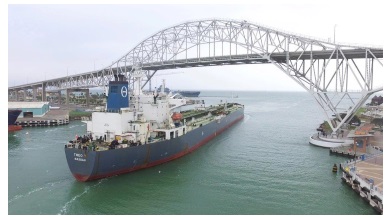Market Opening: Corpus Christi
![]() Print this Article | Send to Colleague
Print this Article | Send to Colleague
First U.S. Crude Oil Export in 40 Years Sails from Corpus Christi
NuStar Energy and ConocoPhillips loaded America’s first export cargo at Port Corpus Christi following the repeal of a 40-year ban on the export of U.S. crude oil, Sold to the international trading company Vitol, the light crude oil left the dock aboard the tanker Theo T on December 31, 2015.
Major investments in terminal operations in recent years have positioned Corpus Christi to take full advantage of this burgeoning market opportunity. Deep water, dock space, and abundant storage along with plans for further channel deepening will accommodate some of the world’s largest tankers for movement of crude and condensate from the port, which is connected by pipelines to the South Texas Eagle Ford Shale and the Permian Basin.
"Infrastructure improvements at Port Corpus Christi have placed our port in a unique position as a critical component in the export of U.S. crude and condensate. Port Corpus Christi’s deep draft ship channel and strategic location to some of the largest production areas in the U.S. provides a secure and competitive supply chain to markets worldwide. Future capital improvements including deepening the ship channel will accommodate larger vessels that are required to cost effectively supply U.S. crude oil to global markets," said John LaRue, Port Corpus Christi Executive Director.
NuStar has invested heavily in recent years to expand its South Texas Crude Oil Pipeline System and in Corpus Christi Terminal operations.
NuStar Energy and ConocoPhillips loaded America’s first export cargo at Port Corpus Christi following the repeal of a 40-year ban on the export of U.S. crude oil, Sold to the international trading company Vitol, the light crude oil left the dock aboard the tanker Theo T on December 31, 2015.
Major investments in terminal operations in recent years have positioned Corpus Christi to take full advantage of this burgeoning market opportunity. Deep water, dock space, and abundant storage along with plans for further channel deepening will accommodate some of the world’s largest tankers for movement of crude and condensate from the port, which is connected by pipelines to the South Texas Eagle Ford Shale and the Permian Basin.
"Infrastructure improvements at Port Corpus Christi have placed our port in a unique position as a critical component in the export of U.S. crude and condensate. Port Corpus Christi’s deep draft ship channel and strategic location to some of the largest production areas in the U.S. provides a secure and competitive supply chain to markets worldwide. Future capital improvements including deepening the ship channel will accommodate larger vessels that are required to cost effectively supply U.S. crude oil to global markets," said John LaRue, Port Corpus Christi Executive Director.
NuStar has invested heavily in recent years to expand its South Texas Crude Oil Pipeline System and in Corpus Christi Terminal operations.
"Based on our investments in Corpus Christi and our South Texas pipeline system, NuStar was well-positioned, equipped and staffed to immediately begin loading cargoes for export," said NuStar President and CEO Brad Barron. "And we plan on further expanding our Corpus Christi operations to provide more options to our customers to move Eagle Ford Shale crude oil, whether it is being moved domestically or internationally. In fact, we are currently in the process of developing a second private dock in the Port of Corpus Christi."

Tanker Theo T departs Corpus Christi laden with the first crude oil to be exported from the United States in 40 years.
Photo: Port Corpus Christi

